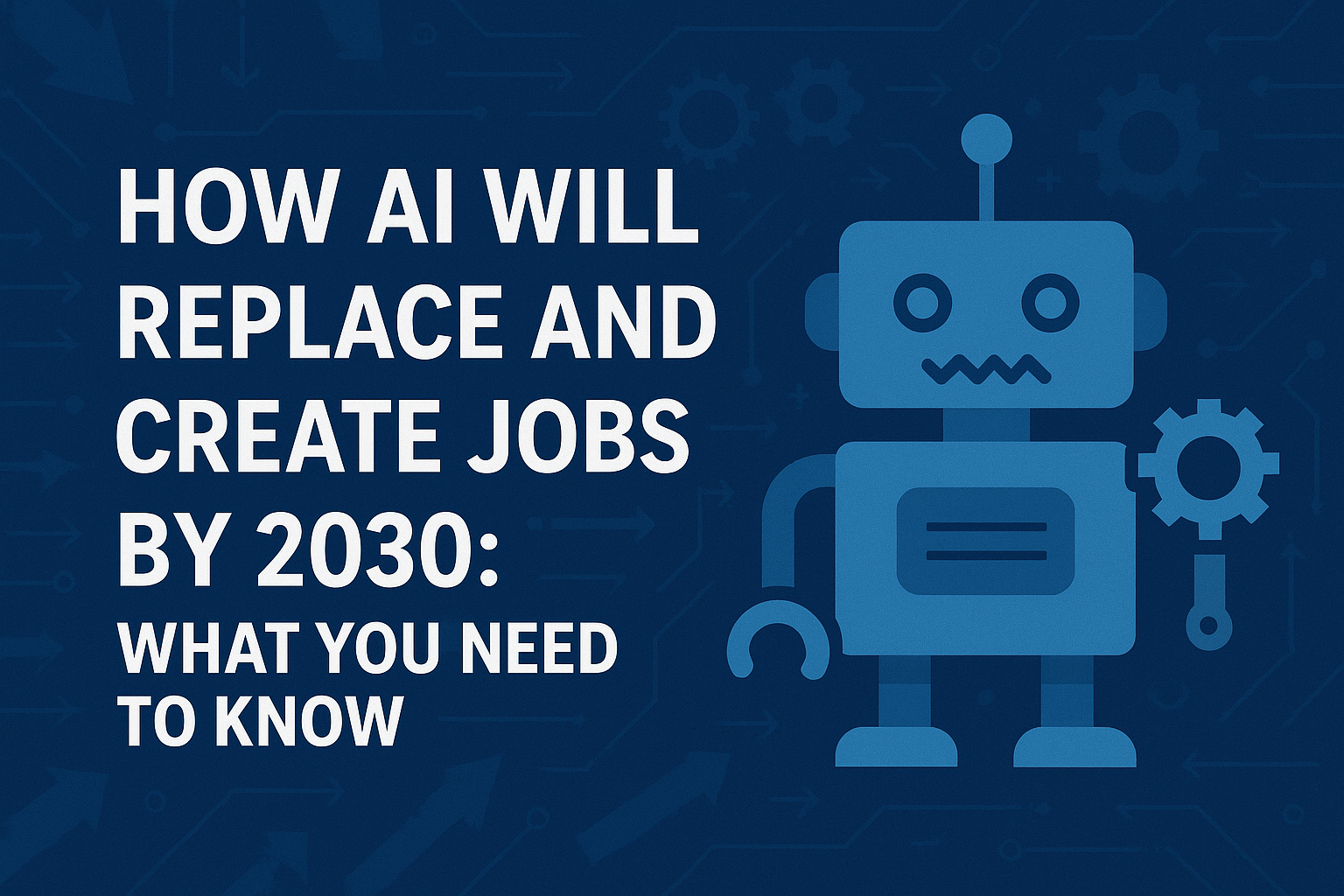Introduction
Artificial Intelligence (AI) is transforming the way we work. By 2030, AI will reshape industries, automate repetitive tasks, and create new job opportunities. Understanding this shift is critical for professionals, students, and businesses.
This guide explores which jobs are most vulnerable, the emerging AI-driven careers, the essential skills you need, and practical steps to thrive in an AI-powered world.
1. Jobs Most at Risk
AI excels in tasks that are repetitive, predictable, and rules-based. Roles that primarily involve manual processing, routine interactions, or standard operations are at high risk.
- Data Entry Clerks: AI systems can process large volumes of data faster and more accurately.
- Cashiers: Automated checkouts and AI kiosks reduce the need for humans.
- Factory Line Workers: Robotics replace repetitive assembly and packaging tasks.
- Administrative Assistants: AI virtual assistants can handle scheduling, email, and queries.
- Basic Customer Support: AI chatbots efficiently handle repetitive FAQs.
2. Emerging AI-Driven Careers
AI also creates entirely new roles. These careers require humans to leverage AI for decision-making, creativity, or oversight.
- AI Engineers & ML Specialists: Build and maintain AI systems for diverse industries.
- Data Scientists: Analyze complex datasets and provide actionable insights.
- AI-Assisted Healthcare Roles: Radiologists or nurses using AI for diagnostics or patient care.
- Cybersecurity Experts: Use AI to detect patterns, prevent threats, and automate defenses.
- Creative AI Roles: Content creators, UX designers, and marketers using AI for ideation and optimization.
3. Future-Proof Skills
To thrive, humans must complement AI, not compete directly. Skills that are uniquely human remain valuable:
- Critical thinking & complex problem-solving
- Emotional intelligence & empathy
- Digital literacy & AI tool proficiency
- Creativity & strategic thinking
- Adaptability & lifelong learning
4. Human + AI = Augmented Workforce
Future roles blend AI efficiency with human insight. AI handles repetitive calculations, but humans make decisions, innovate, and manage ethical implications.
Example: AI predicts sales trends; human managers craft campaigns that resonate emotionally with customers.
5. Industries Most Affected
| Industry | AI Impact |
|---|---|
| Manufacturing & Logistics | Robotics streamline production, reduce manual labor, optimize delivery routes. |
| Healthcare & Diagnostics | AI analyzes scans, predicts diseases, but doctors interpret results for patient care. |
| Finance & Accounting | AI automates bookkeeping, fraud detection, and risk assessment. |
| Retail & Customer Service | Chatbots handle routine queries; humans manage complex customer relations. |
| Marketing & Creative | AI generates insights; humans design campaigns with creativity and strategy. |
6. AI in Education & Upskilling
AI-powered learning platforms like Coursera and Udemy recommend personalized courses. Professionals can rapidly upskill in AI-related fields or complementary human skills.
7. Remote & Hybrid Work Integration
AI facilitates project management, virtual collaboration, and productivity tracking in remote/hybrid setups. Tools like Slack, Trello, and Zoom integrate AI for smarter workflows.
8. Ethical & Regulatory Considerations
AI adoption must address privacy, bias, and employment disruption. Companies are responsible for responsible AI implementation.
9. Entrepreneurship & AI Opportunities
- AI-powered apps (language translation, personalized fitness, nutrition)
- AI consulting for business integration
- Content automation and marketing AI solutions
10. Adapting & Thriving
Success depends on adaptability. Learn AI tools, enhance human-centric skills, and embrace continuous learning.
11. 30-Day Roadmap to Prepare for AI Jobs
- Days 1-5: Identify AI tools and skills relevant to your field
- Days 6-10: Start online courses and set learning goals
- Days 11-15: Apply skills to small projects
- Days 16-20: Network with AI professionals and mentors
- Days 21-25: Deepen learning and
- Days 21-25: Deepen learning and tackle intermediate projects
- Days 26-30: Build a portfolio, update resume and LinkedIn, and apply for AI-related roles or projects
12. Pros and Cons of AI in the Job Market
| Pros | Cons |
|---|---|
| Automation increases efficiency and reduces errors | Some jobs are displaced, leading to short-term unemployment |
| AI creates new, high-paying tech and creative jobs | Requires upskilling and continuous learning for workers |
| Data-driven decisions improve productivity | Bias in AI algorithms can lead to unfair outcomes if not monitored |
| Enables innovation in business, healthcare, and education | Ethical concerns around privacy, surveillance, and human oversight |
13. Real-Life Examples & Case Studies
Healthcare: AI-assisted diagnostics platforms like Zebra Medical Vision analyze millions of scans, helping doctors detect conditions faster and more accurately.
Finance: Companies like JPMorgan use AI for contract review and fraud detection, reducing manual processing time by over 80%.
Retail: Amazon uses AI-powered robots in warehouses and predictive algorithms for inventory management, increasing efficiency and reducing costs.
Creative Work: Designers use tools like Adobe Firefly to generate initial drafts, which humans refine creatively, demonstrating AI-human collaboration.
Conclusion
AI will reshape the workforce by 2030, replacing repetitive tasks while creating innovative roles. Professionals who embrace human-centric skills like creativity, empathy, and strategic thinking, while learning to collaborate with AI, will thrive. Continuous learning, adaptability, and proactive upskilling are the keys to securing a future-proof career.
Related Posts
- How AI Is Changing Our World: A Deep Dive
- The Future of Remote Work in 2025
- Top 10 Programming Languages in 2025
Frequently Asked Questions
Will AI take all human jobs?
No. AI will automate repetitive tasks, but many roles require creativity, emotional intelligence, and strategic decision-making.
Which careers are safest from AI?
Jobs that rely on complex problem-solving, human interaction, creativity, and empathy are less likely to be automated.
How can I prepare for the AI-driven job market?
Learn AI tools, develop human-centric skills, engage in continuous learning, and focus on building AI-human collaboration abilities.
Which platforms are best to learn AI skills?
Trusted platforms include Coursera, Udemy, edX, and LinkedIn Learning. They provide certifications and real-world projects.
Can AI create entrepreneurial opportunities?
Yes. AI enables niche products, consulting, content automation, and startups that leverage AI-driven solutions for businesses and consumers.
